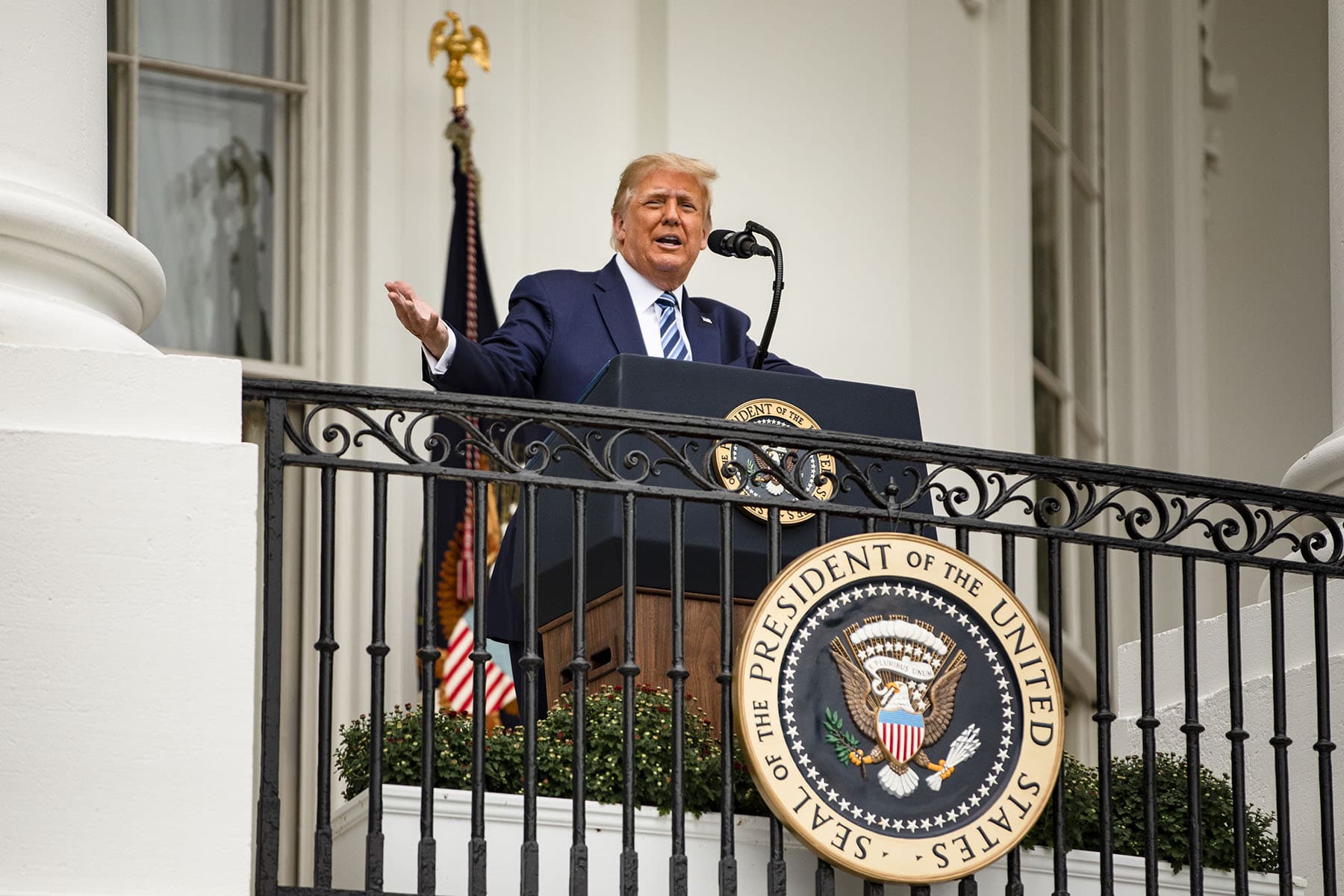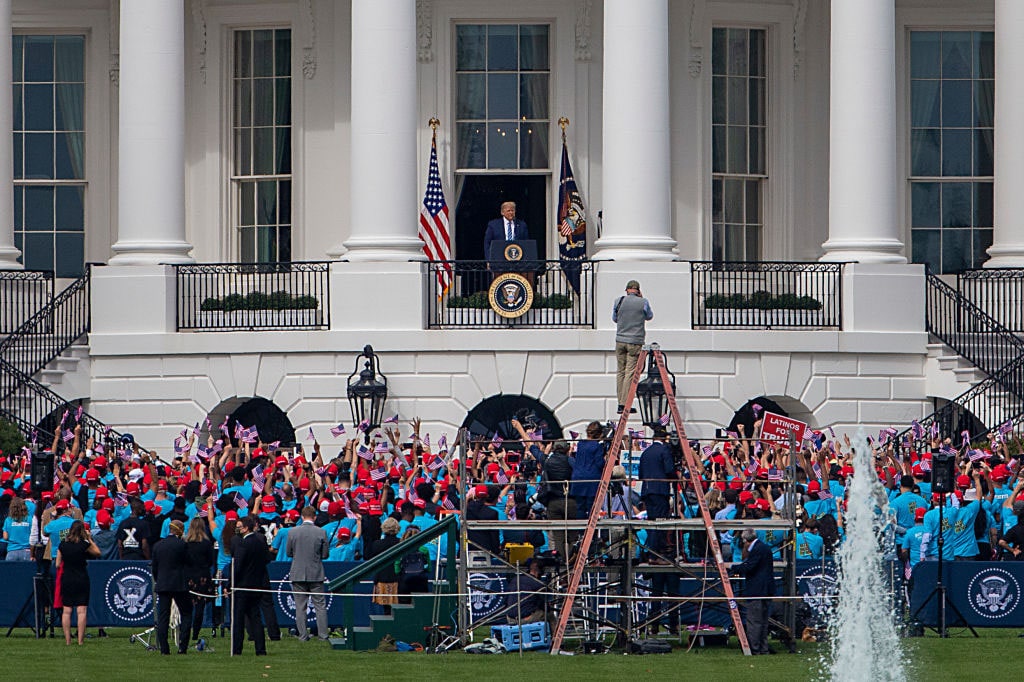 U.S. President Donald Trump addresses a rally in support of law and order on the South Lawn of the White House on October 10, 2020 in Washington, DC. President Trump invited over two thousand guests to hear him speak just a week after he was hospitalized for COVID-19. (Photo by Samuel Corum/Getty Images)
U.S. President Donald Trump addresses a rally in support of law and order on the South Lawn of the White House on October 10, 2020 in Washington, DC. President Trump invited over two thousand guests to hear him speak just a week after he was hospitalized for COVID-19. (Photo by Samuel Corum/Getty Images) Is Donald Trump contagious? Is he immune? Is he in danger? Are we?
So many questions. So few answers. And so little time left before an Election Day that may or may not conclude this extraordinary and unprecedented presidential campaign.
In the early morning hours of Friday, October 2, the political landscape was roiled when Trump announced that he and his wife had been diagnosed with COVID-19. Later that day, he was transported to Walter Reed Hospital. The following day, according to after-the-fact reports, the president may have been struggling to breathe. A day after that, he took a drive to greet supporters who had gathered outside the hospital. And the day after that, Trump returned to the White House, pronouncing himself cured.
Many of Trump’s advisors urged him to use his diagnosis as an opportunity to “reset” his virus-related messaging. The American people have harshly judged his handling of the pandemic, and his inner circle thought that a more empathetic approach based on his experience with the virus might help him regain some of that lost support.
But Trump was unwilling — or possibly unable — to heed their suggestions. He has always relied almost exclusively on the enthusiasm of his most loyal supporters to help him achieve political success, and the likelihood of him trying a new approach was slim at best.
And so the president did not attempt to reassure swing voters that he now understood their COVID-related worries. Instead, Trump directed a message of personal courage and defiance to energize his base. He emphasized his strength in defeating the virus, reinforced his skepticism toward traditional “establishment” experts, and used his recovery as a metaphor for reopening the country and returning to pre-pandemic life.

Trump’s messaging certainly does motivate his true believers, but it is also driving the last remaining swing voters in the other direction. State and national polls released over the last several days show Joe Biden with a growing advantage in swing states, fueled largely by voters’ growing belief that Biden would handle the coronavirus better than Trump.
Although Trump’s doctors have not indicated that the president has tested negative for COVID-19, they have announced that he is no longer contagious. So Trump is returning to the campaign trail this week, planning to attend a series of rallies in key swing states. He has reportedly told his aides he wants to do campaign events every day until the election.
The risks of moving forward so aggressively are considerable—both politically and medically. Most doctors recommend that their patients take up to twenty days to recover, as their weakened state can leave them especially vulnerable to a recurrence of illness.
But actively campaigning may be Trump’s only possible remaining path to victory. The swing voters he has lost over the months of the pandemic appear to be slipping beyond his reach: his behavior since being diagnosed has reinforced their misgivings about his leadership throughout the crisis. Now, his best and last bet is to inspire his supporters to even greater levels of turnout.
Actively campaigning may be Trump’s only possible remaining path to victory.
This is unlikely but not impossible. This week’s confirmation hearings for Judge Amy Coney Barrett could excite conservative voters by reminding them of the importance of judicial appointments. There are many registered white working-class voters in Midwestern swing states who did not turn out in 2016, and Trump’s anti-establishment message regarding the virus could inspire them. (Since the spring, COVID-19’s greatest impact was in these densely-populated areas, and Trump’s tirades against medical professionals has stoked resentment against those advocating for a slower reopening).
But Trump might also be aware that such a strenuous schedule for a recovering COVID-19 patient will test all known health and medical boundaries and that exerting himself could easily lead to a recurrence that would sideline — and possibly hospitalize — him. If the coronavirus does force Trump to forego in-person campaigning, such a dramatic occurrence could provide him with one last excuse if his comeback falls short.
Trump has long cited the potential of voter fraud as a possible rationale for his defeat. But wouldn’t his defeat be more inspiring to his supporters (and to himself) if it came not because of unverified ballot malfeasance, but instead at the hands of an implacable disease? Such a valiant anti-COVID-19 fight could motivate Trump’s troops to the polls on Election Day. But if not, what a final chapter Trump could have written to buttress his self-told legend.
Dan Schnur teaches political communications at UC Berkeley, USC and Pepperdine. He hosts the weekly webinar “Politics in the Time of Coronavirus” for the Los Angeles World Affairs Council & Town Hall.























 More news and opinions than at a Shabbat dinner, right in your inbox.
More news and opinions than at a Shabbat dinner, right in your inbox.